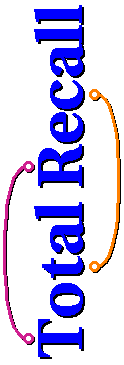
|
Leana GolubchikOkawa Foundation 2002 Research Grant Acceptance SpeechOctober 2, 2002, San Francisco |
||
|
The Okawa Foundation asked me to say a few words,
on behalf of this year's recipients of the Okawa Research
Grants, and comment on technology trends and their affect
on society.
First, on behalf of all the recipients, I would like to thank the Okawa foundation for their generous support of technological research and of our research efforts; this support gives us more freedom to pursue our long term research goals. I believe that technology's long term goal and its ultimate purpose is to improve people's quality of life. One of the things I'm working on, to this end, is something I call personal information systems (with the word Personal being key here). One aspect of improving quality of life is to be able to substitute for abilities that are missing or are diminishing or otherwise require help or improvement. Memory is one such ability. I think it would be great if I could remember every conversation I ever had, every place I visited ... and be able to play it back (or recall it) for myself or for others. My colleagues and I are working on a system called Total Recall. The idea of Total Recall is to be able to remember when an event happened, where it happened, who was there, why it happened, and how we felt. It starts with the use of personal sensors, like a microphone array in my glasses or a camera in my necklace (which I could have been wearing) and other sensors, all used to record *my* version of the world. Some people's first reaction, when they hear about a system that records everything, every moment, and everywhere you go, is fear. After all, who knows who else might get their hands on this information. But, the reality is that this is already starting to happen around us. For instance, there are cameras (webcams) everywhere; on traffic lights, on highways, in buildings. So, I think a world that is constantly recording will come sooner or later. And, it is up to us, researchers and technology developers, to make sure that it is done right, with proper security, privacy, and integrity measures. There are always scary uses of technology, but I believe this technology can result in a lot of good, if done right We have enhanced our eye-site with glasses, our time keeping ability with watches, so why not enhance our memories as well? But, Total Recall is not simply a memory enhancer, it has many other applications in health-care, education, support of elderly and people with disabilities. For instance ... A microphone array placed on a hearing impaired person's glasses can collect audio which gets converted to text and displayed on their PDA in near real time. To be able to recall a patient's food intake and environments they've been in can help with discovery of allergies. Monitoring food intake of diabetics can provide automatic warning signals when appropriate. Or being able to review a patient's state before and after a serious health problem, like a heart attack, can help doctors arrive at a more accurate diagnosis, in an emergency situation. Total Recall presents many research challenges. Real-time collection of data from millions of personal sensors simultaneously is no small task. A campus like USC has at least 20,000 students, collecting that amount of information from small wireless mobile devices would certainly be a challenge. Imagine what it would be like to do this for a city like SF or LA. Such a system might also change the way the Internet operates, with millions of simultaneous uploads, not just downloads. A lot of research has gone into designing the Internet to handle massive downloads. To be useful, scalable, and widely accessible, such a system must operate over the untrusted public Internet. However, people's privacy must be protected absolutely. There must be absolutely no way to get to the data unless access is explicitly granted by its owner. There are also challenges in signal processing, for example, due to noisy environments; in spite of these noisy environments, we must be able to segment audio and video, and be able to transform this data into forms useful for information processing, such as indexing, searching, and querying. All this must be done under the same stringent privacy concerns. And, there are many more challenges, such as in natural language processing, voice recognition, image understanding, and on and on ... Our first application of Total Recall will be in education; we'll experiment with a better learning environment for students at USC, to enhance all aspects of learning, not just a lecture environment. We hope to first improve the students' quality of life since they are a captive audience. And I hope this will pave the way for a wider acceptance of such technology in our society because, ultimately, I believe that this technology will improve quality of life for a large number of people. Thank you for listening ... And, thank you again to the Okawa Foundation for their generous support. |
||
| Contact | ||
| For more information, please contact professor Leana Golubchik. | ||